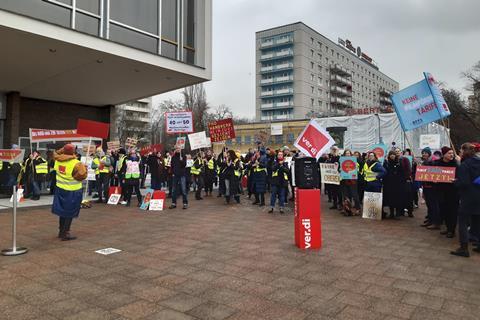
Germany’s film industry unions have been holding demonstrations on the first day of the Berlinale to call for better working conditions, while the guild of Berlin’s taxi drivers is voicing its opposition to Uber being one of the festival’s main sponsors by staging its own film festival in a taxi near Potsdamer Platz .
The Union Day organised by the ver.di FilmUnion began early on Thursday morning with a demonstration in front of the Kino International ahead of the German Producers Alliance’s Producers Day which was opened with a keynote by Claudia Roth, state minister for culture and the media, on her plans for the restructuring of German film funding system.
The aim of the protestors was to draw Roth’s attention to their demands for collective pay agreements to be enshrined in the legislation of the revised German Film Law (FFG) which is due to come into effect from the beginning of 2025.
A second protest action entitled “Cinema & Film: Not Without Us!” was being planned by ver.di FilmUnion with staff members from the CinemaxX and CineStar multiplex chains in front of the Berlinale Palast ahead of Thursday’s opening film.
This was prompted by ongoing pay negotiations with the two cinema chains which have seen unions calling for the starting hourly wage to be raised to €14, while the employers’ side has only been prepared to offer €12.41.
In the meantime, ver.di has called for token strikes at the two chains’ cinemas throughout Germany, including Berlin, from today (February 15) until Sunday (Feburary 19) to press for an improvement to the pay offer.
“The token strikes are a clear signal to the employers to take our demands seriously,” said ver.di’s chief negotiator Martha Richards.
Meanwhile, the guild of Berlin’s taxi drivers are showing their opposition to Uber being one of the Berlinale’s main sponsors by organising their own TaxiFilmFest in a taxi in Potsdamer Strasse near to the festival’s headquarters.
Up to eight people will be able to fit into the people carrier to watch the films, and video conference links are planned for people watching the same films at home to also discuss the films afterwards with the taxi’s occupants.
The film selection includes Gerard Piries’ action comedy Taxi and (naturally) Martin Scorsese’s Taxi Driver which will be shown on February 20 when the veteran US director is to receive his honorary Golden Bear in a gala ceremony.
The taxi drivers’ cause has been taken up in Berlin’s House of Representatives by members of the Die Linke party who tabled a motion at the beginning of this month calling on the Senate administration to explore alternative sponsorship options other than Uber with the Kulturveranstaltungen des Bundes in Berlin (KBB) organisation which oversees the running of the Berlinale.






![The Brightest SunScreen[Courtesy HKIFF]](https://d1nslcd7m2225b.cloudfront.net/Pictures/274x183/3/5/0/1448350_thebrightestsunscreencourtesyhkiff_312678.jpg)


















No comments yet